Planning to expand in the UK market? Here’s what you should consider: a highly competitive market demands a customised strategy to succeed. Since 72% of people respond only to marketing that feels tailored to them, localised B2B lead generation has become non-negotiable. Given the UK market’s highly competitive nature. To reach the right prospects, you need to understand local expectations. You also need to be aware of relevant regulations and typical buying habits. When executed effectively, this approach builds trust. It also delivers long-term results.
This blog looks at how lead generation works in the UK market. It also outlines key considerations for maintaining GDPR compliance throughout the process. Whether entering the UK market for the first time or refining an existing strategy, this guide provides the clarity and insight needed to proceed with confidence.
Localisation in B2B
Localisation refers to the process of modifying a product or content to align with the language, culture, and legal standards of a particular market. It enables companies to engage with local audiences and expand into new international markets.
Related: How B2B EU Companies can expand to APAC
UK B2B buying habits differ from global trends, emphasising trust, compliance, and fostering long-term relationships over factors such as price or speed. The procurement process is more formal and risk-averse, focusing on meeting regulatory standards, such as the General Data Protection Regulation (GDPR) and Environmental, Social and Governance (ESG).
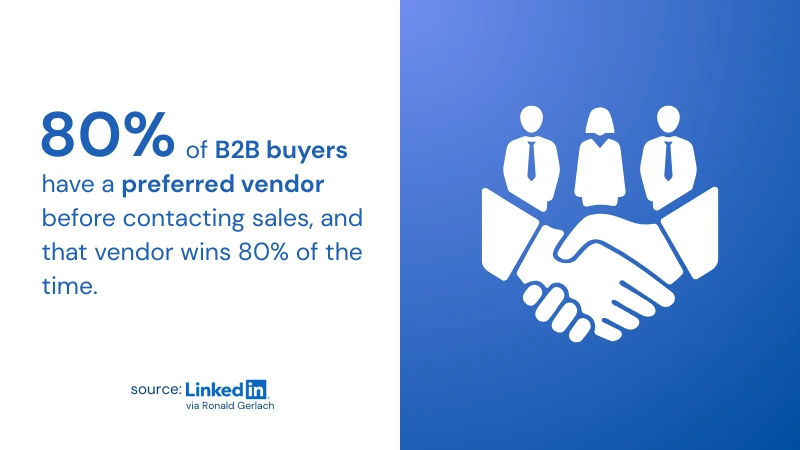
Recent studies highlight that UK B2B buyers place a high priority on reliability and proven solutions. According to the 2024 Buyer Experience Report by 6sense, 80% of B2B buyers already have a preferred vendor by the time they first contact sales, and that vendor wins the contract 80% of the time.
Why Local Leads Matter
Localization helps businesses connect with local audiences by tailoring products, services, and messaging to fit regional needs. This approach enhances relevance and trust, both of which are crucial for building loyalty and business growth. Companies that localise see strong results: 84% report a positive impact on revenue, and 72% of consumers prefer content in their native language, highlighting localisation as a potent edge in lead generation.
Want More UK-Based Leads?
Local leads matter for several reasons:
- Convenience: When your business is located close to customers, it improves their ability to visit, receive assistance, and develop a personal connection, which increases their likelihood of trusting and choosing your services.
- Improved Conversion Rates: Marketing that utilises relatable language and local references fosters a personal connection and drives higher conversion rates.
- Quicker Sales: By understanding local needs, you can provide more relevant solutions and close deals more efficiently.
- Word of Mouth: Satisfied customers are more likely to recommend your business to friends and family. This helps you reach more local prospects.
- Local SEO: Optimising your website and business listings for local searches makes it easier for potential customers nearby to find you.
- Cost-Effective Marketing: Local marketing strategies, such as targeted ads or community event participation, are usually more affordable and often produce better results than broader campaigns.
Hosting your event soon? Learn how to generate leads with business events
Download the guide for free
- Community Involvement: Getting involved in local activities or supporting community initiatives helps build trust and integrate your business into the neighbourhood.
- Competitive Edge: Targeting your local market enables you to differentiate yourself and establish a stronger presence compared to competitors who do not prioritise local engagement.
B2B Market Insight in the UK
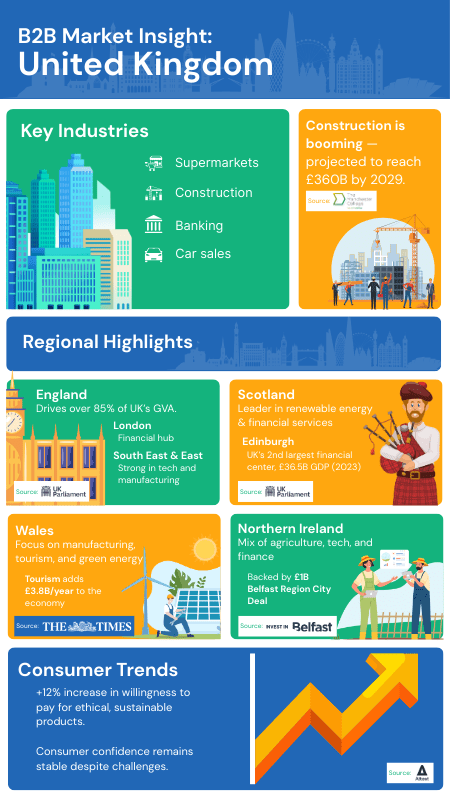
The UK economy remains service-led, with supermarkets, construction, banking, and car sales generating the most revenue. Construction is growing fast, projected to hit £360 billion by 2029.
- England dominates the UK’s economic landscape, contributing over 85% of the total Gross Value Added (GVA). London leads in finance, while the South East and East are strong in technology and manufacturing.
- Scotland Excels in renewable energy and financial services. Edinburgh is the UK’s second-largest financial center, with a GDP of £36.5 billion in 2023.
- Wales Focuses on manufacturing, tourism, and green energy. Tourism contributes approximately £3.8 billion annually to Wales’ economy.
- Northern Ireland Combines agriculture with growing tech and finance sectors, supported by cross-border trade and the Belfast Region City Deal, which secures £1 billion of transformative co-investment.
Consumers are increasingly value-driven, with a 12% rise in willingness to pay more for ethical, sustainable products. Confidence remains stable despite economic concerns.
Businesses are using AI and automation to personalise experiences. Stricter crypto regulations aim to strike a balance between innovation and protection.
With people spending over two hours daily on social media, localised marketing, through targeted messaging, local SEO, and community engagement, is proving essential. Adapting to regional needs enables businesses to build stronger connections and remain competitive.
See How a UK Company Expanded its market reach into APAC with Callbox.
GDPR Basics
Understand the UK GDPR before launching local lead generation strategies in the UK, as it governs how businesses collect, use, and protect personal data. Companies must justify data processing by either securing informed consent or demonstrating a legitimate interest. They must also make it easy for individuals to give and withdraw consent.
The United Kingdom’s General Data Protection Regulation grants individuals rights over their data, including the right to access, correct, delete, and object to its processing. Businesses must ensure data security, retain data only for as long as necessary, and comply with regulations governing international data transfers.
Lead generation services provider companies must have proper agreements, conduct regular audits, and maintain strong security practices. Staying informed about GDPR updates is crucial for compliance and customer trust.
- Lawfulness, Fairness, and Transparency – Manage data in a legal, fair, and transparent manner.
- Purpose Limitation – Gather data solely for explicit and legitimate purposes.
- Data Minimisation – Collect only the data essential for the task at hand.
- Accuracy – Ensure that data is both accurate and kept up-to-date.
- Storage Limitation – Retain data only for the necessary time.
- Integrity and Confidentiality – Safeguard data using appropriate security measures.
- Accountability – Demonstrate compliance with GDPR.
Local Lead Generation Strategies
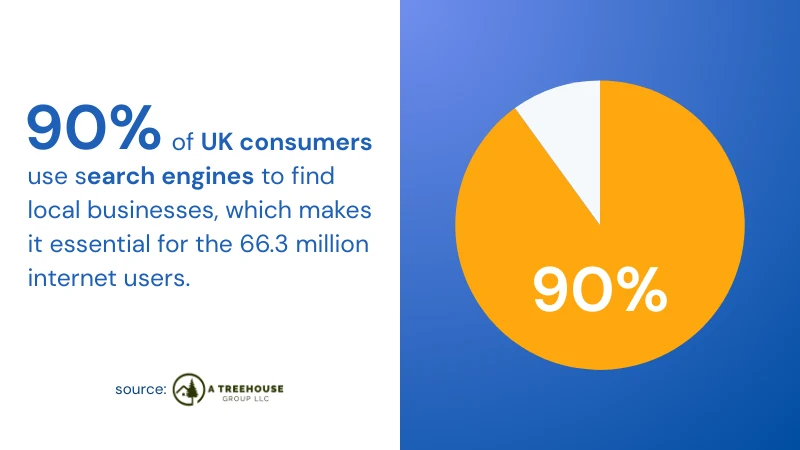
In 2025, businesses targeting UK audiences must adapt their lead generation strategies to local behaviours, regulations, and preferences. With over 66.33 million internet users in the UK and more than 90% of consumers using search engines to find local businesses, localised digital marketing is more important than ever. Understanding regional nuances, compliance with UK GDPR, and leveraging local platforms are necessary for effective lead generation and long-term customer relationships.
Below are five key strategies to help businesses generate qualified local leads in the UK market.
A. Optimise Local SEO
UK consumers often begin their search for products or services online, using phrases like “near me” or specifying their location. Appearing in local search results, particularly on Google, is crucial for connecting with nearby customers. Strong local SEO enhances your visibility, making it easier for prospects to locate and interact with your business, which can lead to more enquiries, visits, and conversions.
Here are three practical tips to boost your local search presence:
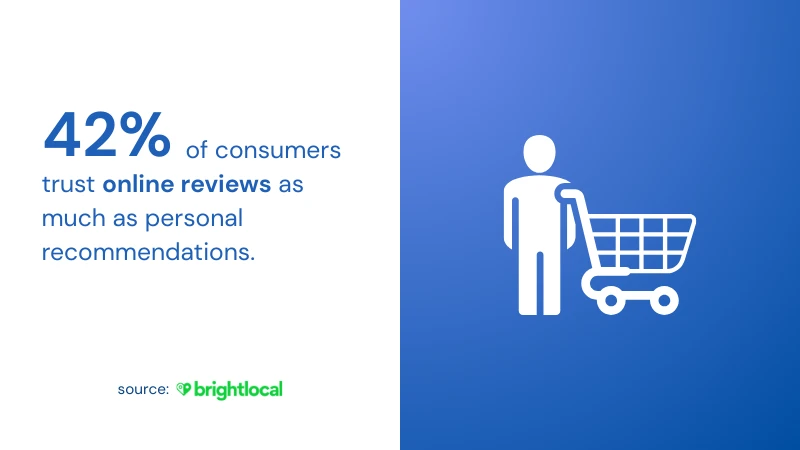
- Claim and update your Google Business Profile to ensure accurate business hours, location, services, and photos.
- Utilise local keywords (“near me”) and create location-specific landing pages.
- Encourage UK-based reviews and respond to them publicly—42% of consumers trust online reviews as much as personal recommendations.
B. Create Relevant Content
To effectively engage your UK audience, your content must resonate with their local context. This involves incorporating regional language, cultural references, and an understanding of key UK regulations. By aligning your content with their specific needs and preferences, you will foster trust and create a more significant impact.
Example:
- Use UK-specific spelling and terms, like “favourite” instead of “favorite” or “petrol” instead of “gas.”
- Address UK regulations or industry-specific updates, such as Brexit-related changes or the UK GDPR, which affects how businesses handle data.
- Share regionally relevant blog posts, case studies, or success stories to build trust and credibility. For example, a legal firm in Bristol could write about how UK data laws impact small businesses in the South West.
C. Build Social Proof
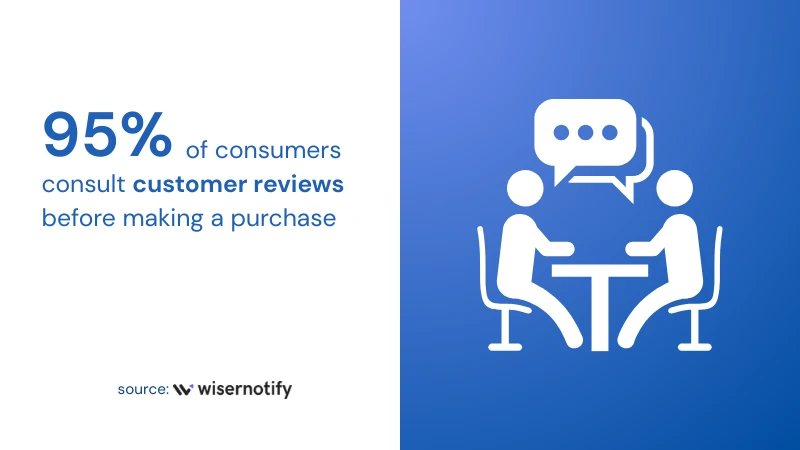
Trust plays a significant role in purchasing decisions. Customers are more likely to choose businesses they trust. Sharing positive reviews from your UK customers can build that trust and increase your chances of converting leads into loyal customers. In fact, 95% of consumers consult customer reviews before making a purchase, and 86% consider reviews to be an essential resource when making buying decisions.
Here’s how you can approach it:
- Display testimonials and reviews from UK customers on your website and in your promotional materials to improve your credibility.
- Use well-known platforms that UK consumers trust, such as Trustpilot, Feefo, and Google Reviews.
- Showcase case studies from reputable UK brands or clients to further bolster your reputation.
D. Segment Email Campaigns
Customized emails tend to attract more attention from your audience and boost conversion rates. By tailoring your emails to different segments of your audience, you can enhance the relevance of your messaging, thereby increasing the likelihood that your recipients will engage with your content.
- Segment your list by location, industry, company size, or previous behaviour.
- Use local references or events in subject lines and body content to make emails feel more relevant.
- Comply with the UK GDPR—always obtain clear consent and provide simple opt-out options.
Read more about Email Marketing Best Practices for More Sales
E. Network Locally
While digital strategies are essential, in-person interactions and community engagement remain highly effective in the UK. Building a local presence nurtures trust, increases visibility, and fosters valuable relationships that drive long-term business growth, enabling businesses to connect more authentically with their audience and enhance their reputation within the community.
- UK Trade Shows & Events: Participating in events like The Business Show London and Marketing Week Live helps increase visibility and networking opportunities
- Local Influencers and Agencies: Collaborating with local influencers and agencies boosts brand awareness through trusted voices
- Sponsoring Local Events: Sponsoring local events strengthens community ties and brand recognition.
- Local Public Relations and SEO: Local PR coverage can generate valuable backlinks to improve SEO rankings
Measuring Success
Track specific metrics to determine if your efforts are delivering results:
- Conversion Rate – How many leads turn into actual customers?
- Lead Quality – Are you attracting the right people who are likely to buy?
- Cost Per Lead – How much you spend to get each new lead.
- Regional ROI – How much profit you make from different locations.
CRM (Customer Relationship Management) tools help you collect and organise customer data, track how leads interact with your business, and see which campaigns or areas are performing best. They make it easier to adjust your multi-channel strategy based on real results and keep your team aligned.
Final Thoughts
Focusing on local lead generation in the UK makes your company more relevant and trustworthy to your intended audience. By customising your strategy to regional tastes, values, and language, you may enhance connections and foster long-term relationships.
To achieve meaningful results, take a multi-touch, multi-channel approach. Personalised emails, localised content, SEO, social media platforms, and local events can all help you reach your target audience. Continuously test your techniques, be adaptable, and tweak your strategy as needed. The more you personalise your efforts to the local market, the more likely you will be to expand, gain trust, and retain customers.













